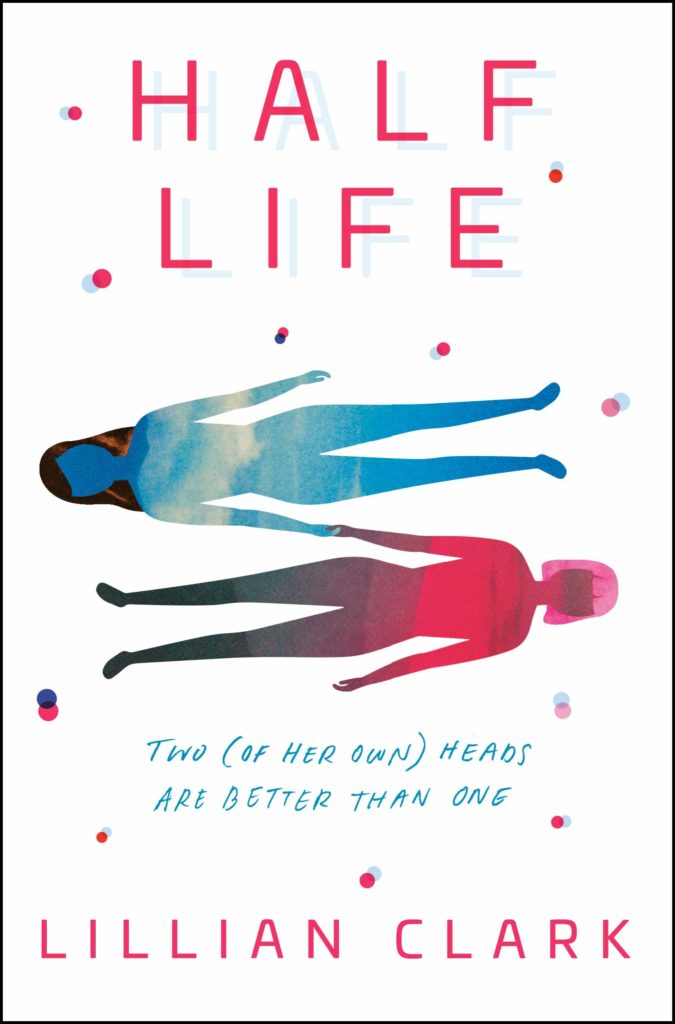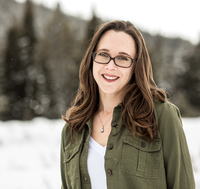If you have been following me for a while, you know I’m a HUGE fan of Lillian Clark. I adored Immoral Code and I was stunned by the amazing Half Life! Lillian is amazing at characters and I’m so happy she agreed to do an interview with me on writing, characters, and Half Life!
Half Life
An overachiever enrolls in an experimental clone study to prove that two (of her own) heads are better than one in this fast-paced, near-future adventure that’s Black Mirror meets Becky Albertalli.
There aren’t enough hours in the day for Lucille–perfectionist, overachiever–to do everything she has to do, and there certainly aren’t enough hours to hang out with friends, fall in love, get in trouble–all the teenage things she knows she should want to be doing instead of preparing for a flawless future. So when she sees an ad for Life2: Do more. Be more, she’s intrigued.
The company is looking for beta testers to enroll in an experimental clone program, and in the aftermath of a series of disappointments, Lucille is feeling reckless enough to jump in. At first, it’s perfect: her clone, Lucy, is exactly what she needed to make her life manageable and have time for a social life. But it doesn’t take long for Lucy to become more Lucy and less Lucille, and Lucille is forced to stop looking at Lucy as a reflection and start seeing her as a window–a glimpse at someone else living her own life, but better. Lucy does what she really wants to, not what she thinks she should want to, and Lucille is left wondering how much she was even a part of the perfect life she’d constructed for herself. Lucille wanted Lucy to help her relationships with everyone else, but how can she do that without first rectifying her relationship with herself?
Find Half Life on Goodreads, Amazon, Indiebound, Bookshop.org & The Book Depository.
Interview
So Black Mirror is compared to Half Life, have you seen Black Mirror, do you have favorite episodes? Or other tv shows that give you similar Half Life vibes?

Yes, I have! And I think the show’s a pretty perfect comp for HALF LIFE, which definitely includes that near-future tech warning that most episodes revolve around. I tend to love some episodes and not care for others. A few of my favorites have been “Nosedive,” “San Junipero,” and “Be Right Back” (which was so quietly unsettling). Other shows include Orphan Black, which I LOVE, though is much, much darker than HALF LIFE (Tatiana Maslany is a genius), and Living with Yourself, which I’ve only seen a couple episodes of but shares a very similar concept.
Lucille’s fear of not being enough and being an overachiever hit me SO hard, can you talk about what it was like to write this character and what was your inspiration?
This is a fabulous question. I wrote about Lucille’s fears because I share them. She isn’t based on me, by any means, but that desperate worry about not keeping up, doing enough, being enough, has always plagued me. I still struggle with it today! But as a teen, especially, it’s so hard to feel complete and “correct” because you’re constantly being tugged in different directions by often disparate expectations. I think most people feel some of this, but I think teen girls have it especially tough. The expectations set on teen girls’ shoulders are just ridiculous. Beauty standards, behavior standards, and so on. And the worst part is that they’re usually in direct competition with each other, or about keeping young women within a confused, too-tight box. Be beautiful but not arrogant, be smart but not smarter, be available but not a “slut,” be perfect but not too perfect because then you’re a threat.
Thinking through all of that, which is complex and personal and a bit different for each person, what I really wanted was to write a character (or, characters) who grappled with it and came out knowing that despite those pressures, we all have inherent value. You’re already enough.
When you think of a new project, do you think of a scene, a character, a line, a piece of the world first?
It depends! I’m working on one now that started with a single visual which turned into a scene which is, slowly, turning into a plot. With both HALF LIFE and IMMORAL CODE, I started with a simple concept, which then twisted and adjusted as I actually wrote the books. Another (shelved) idea started with a character. So, yeah! I think it depends entirely on the specific project.
At some point you have POVs from Lucy versus Lucille, can you talk about how it was like to write these two POVs?
Yes! Writing them was honestly so much fun. Developing their voices and personalities ended up being a matter of examining the relationship between memory, perception, and personality. How much of that is inherent? How much is learned? Lucille and Lucy share the same (well, duplicated) body, the same life, the same memories. But Lucy’s experience of those things is very different from Lucille’s because her context is so different. Digging into that was a challenge, but incredibly interesting.
Have you ever thought of cloning yourself? What would you have your clone do?
Haha, yes. Though I’m solidly on the “NO WAY” side in the end. It’d be fabulous in theory to have a clone to help with chores and childcare and whatever else, but we’d drive each other mad, hahaha. Not to mention the seriously messy ethics of it all, ha.
Self-acceptance and figuring out what we really want is a big theme in Half Life, can you talk about what it means to Lucille?
Yes! My heart! It truly is the moral of the whole story. It’s that inherent worth thing. We all have value, whether we’re ticking off the boxes others list out for us or not. This is something I still struggle to remember for myself. That my value is not contingent on my achievements or accolades, what others think of me or even what I think of myself. It’s an incredibly difficult idea to shake off! In the book, Lucille seeks external validation to substitute for self-acceptance. But even when she gets that, she finds it isn’t enough. Because as “embroidered pillow” as this sounds, you have to love yourself first.
Lucille is going through some rough times with her friends and family, did you always know about these characters and situations when writing? Or how did they evolve in the process of your drafts?
What an interesting question! Yes, I did always know about these situations while writing. Lucille’s relationships with her friends and parents stayed the same from the beginning. What changed was Lucille herself. I always knew I was writing a book about changing relationships, the way friendships shift as we get older, and the way other peoples’ relationships (like her parents’) look different from the outside. But the way Lucille interacts with them changed drastically from one draft to the next. It took me a lot of work to finalize Lucille, I think because I was avoiding the root of her in a way. I kept trying to push her to be someone she wasn’t, but once I embraced her vulnerability and self-doubt and what she really wanted, the rest of it fell into place.
Find Half Life on Goodreads, Amazon, Indiebound, Bookshop.org & The Book Depository.
About the Author

Lillian Clark, a graduate of the University of Wyoming, grew up riding horses, climbing trees, hiking, and going on grand imaginary adventures in the small-town West. She’s worked as a lifeguard, a camp counselor, and a Zamboni driver, but found her eternal love working as a bookseller at an independent bookstore in historic downtown Laramie, WY. Now living with her husband, son, and two giant dogs in the Teton Valley of Idaho, she spends her snowy winters and sunny summers reading almost anything and writing books for teens.